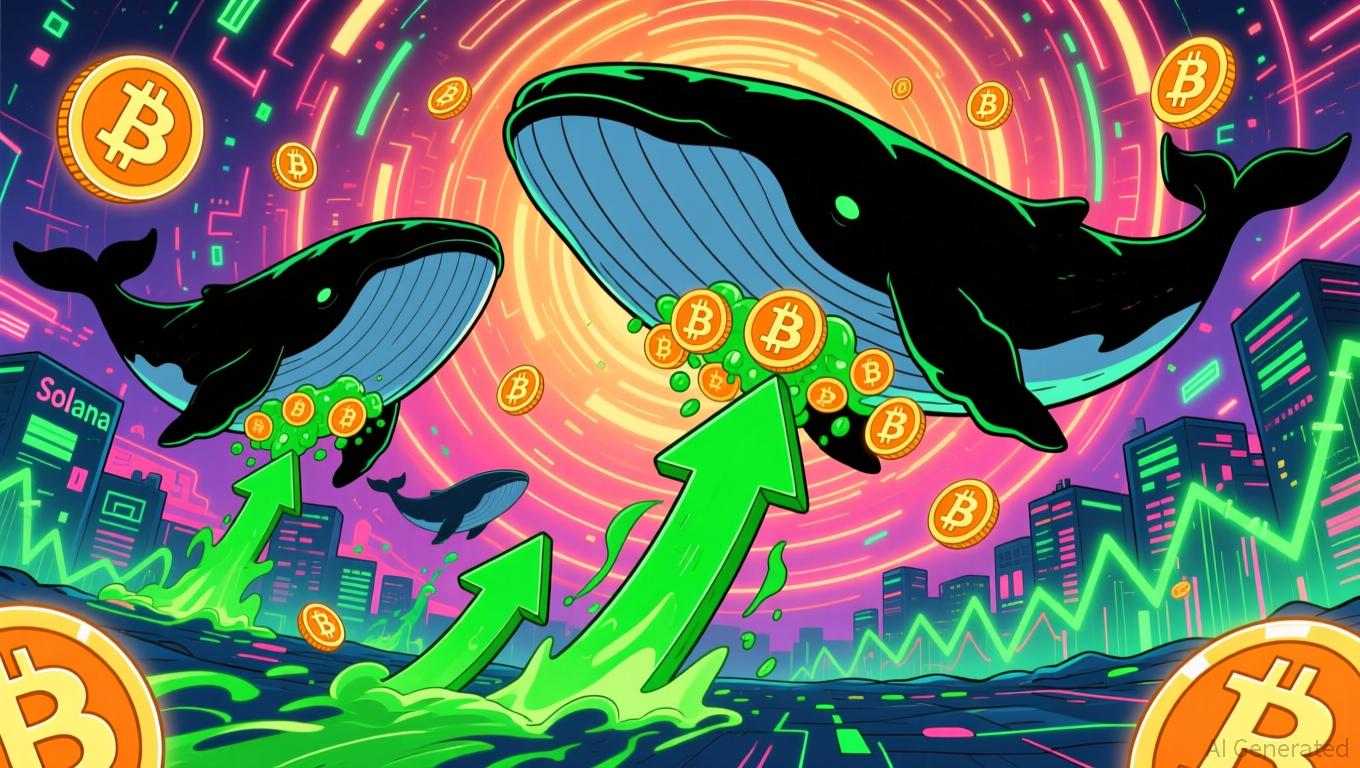Bitcoin Updates: Japan Implements Bitcoin Mining as a Digital Solution to Balance and Stabilize Power Grids
- Japan launches first state-connected Bitcoin mining project via Canaan's 4.5MW hydro-cooled servers to stabilize energy grids using surplus renewables. - Canaan's "digital load balancers" dynamically adjust hashrate to absorb excess solar/wind energy, aligning with Japan's renewable goals and reducing waste. - Government-backed initiative joins 10 other nations monetizing surplus electricity through mining, supported by regulatory reforms reclassifying crypto as financial assets. - Project builds on TEPC
Japan is on track to become a world pioneer in merging
The Avalon A1566HA servers from Canaan are engineered to function as “digital load balancers,” automatically modulating hashrate, voltage, and frequency to either absorb excess renewable power or decrease consumption during high-demand periods. This technology supports Japan’s renewable energy ambitions and helps address the variability of solar and wind generation. The hydro-cooling design further boosts energy efficiency by minimizing heat in power-intensive settings, as highlighted by Bitcoin.com. “Utilities have the opportunity to use Bitcoin mining as a digital load management tool,” stated

This project builds upon previous trials by Tokyo Electric Power Company (TEPCO), which in 2024 experimented with small-scale Bitcoin mining in Gunma and Tochigi prefectures using surplus renewable energy. These pilot programs aimed to reduce energy waste during off-peak times and help stabilize the grid, as reported by
Japan’s regulatory framework is also shifting to accommodate these changes. Suggested updates include categorizing cryptocurrencies as financial instruments under the Financial Instruments and Exchange Act, implementing a uniform 20% tax on crypto profits, and allowing more regulated banks to offer digital asset services. These reforms are part of a broader effort to formalize Japan’s digital asset industry, linking it with advancements in energy and financial security, as noted by Bitcoin.com and FinanceFeeds.
The launch of this project aligns with Japan’s larger movement toward greater energy efficiency. By converting unused electricity into Bitcoin during periods of low consumption, utilities can keep energy usage steady without needing to curtail output, potentially opening up new revenue opportunities. This approach is similar to government-supported initiatives in other nations, where Bitcoin mining is used to make use of otherwise wasted or surplus power, a point emphasized by FinanceFeeds.
Canaan’s rollout follows comparable grid-balancing projects in Europe, such as a Dutch program last year. While the company’s stock has received mixed reviews from analysts, with operational gains tempered by ongoing financial hurdles, its strategic focus on the intersection of AI, green energy, and blockchain technology highlights its commitment to sustainable infrastructure for the future.
Currently, Japan’s share of the global Bitcoin hashrate stands at 0.048% (about 0.5 exahash per second), but the Canaan project could greatly increase this figure. As Japan continues to advance its digital asset regulations and energy strategies, Bitcoin mining may become a key factor in balancing the power grid and driving innovation in the crypto industry, according to Bitcoin.com.
Disclaimer: The content of this article solely reflects the author's opinion and does not represent the platform in any capacity. This article is not intended to serve as a reference for making investment decisions.
You may also like
Web3 Rewards Program Fuels Surge in TWT and 1INCH
- Trust Wallet's TWT and 1INCH tokens gain momentum as Trust Premium loyalty program boosts user engagement and on-chain activity surges. - TWT trading volume rises to $32.98M while 1INCH hits $110.86M weekly volume, supported by technical indicators and ecosystem integrations. - TWT stabilizes above $1 with key resistance at $1.2935, while 1INCH tests $0.2330 level amid bullish MACD and RSI signals. - Trust Premium's tiered rewards and 1inch integration create flywheel effects, linking user activity direc

Bitcoin Updates: Bitcoin Stands Strong Against Withdrawals While Solana ETFs Spark Optimistic Investments
- Bitcoin stays above $100,000 despite ETF redemptions, driven by whale buying and Solana ETF inflows. - Solana ETFs attract $421M in 5 days, outperforming Bitcoin/ETH ETFs with $799M+ outflows. - Analysts link market resilience to institutional confidence in Solana, macroeconomic uncertainty, and seasonal crypto trends. - Grayscale's low-fee GSOL ETF enters market with $102M AUM, highlighting growing institutional demand for Solana exposure. - Long-term optimism persists as Bitcoin's $1T+ market cap chall

Bitcoin slips 0.55% as India clarifies regulations, large investors take short positions, and ETF filings increase
- India's High Court recognizes Bitcoin as legal property, granting ownership rights and enhancing exchange accountability. - Tether boosts BTC holdings by 961 BTC ($97.18M), now holding 87,296 BTC ($8.84B) as part of its profit allocation strategy. - A whale realizes $12.99M profit from BTC shorting, maintaining a $124M position at an average entry price of $111,499. - BTC drops 0.55% in 24 hours amid regulatory clarity in India, while 7-day and 1-month declines highlight market volatility.
Dogecoin News Update: SEC Sets November 2025 as Pivotal Deadline for Dogecoin ETF Approval
- Bitwise files a fast-track SEC 8(a) ETF application for Dogecoin , targeting November 2025 approval if regulators remain silent. - The move reflects growing institutional demand for crypto exposure amid regulatory uncertainty and a competitive ETF landscape. - Grayscale's DOJE ETF and rivals' XRP/Dogecoin products highlight intensified competition, with $24M+ in early trading volumes. - Analysts project 300% DOGE price gains if resistance breaks, while SEC's crypto-friendly leadership and legal battles w
